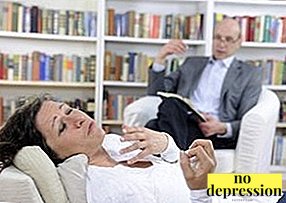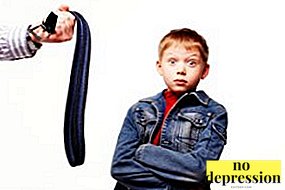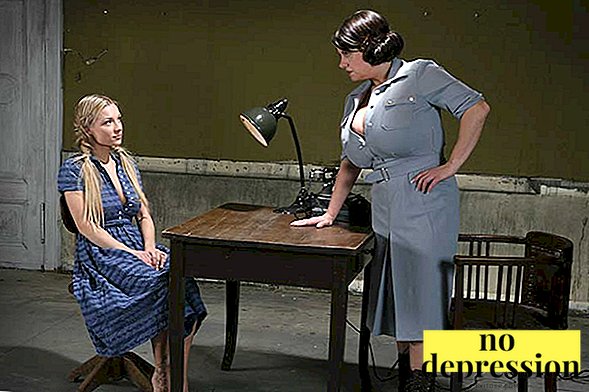Every year the number of women suffering from postpartum depression increases.
According to scientists, the number of such women is about 15-20%, and every second mother has a severe illness.
Many people associate the depression of a young mother with fatigue and lack of sleep, but postpartum depression has certain symptoms and treatments. This is a serious problem, not a whim or a game of hormones.
What is it?

Postpartum depression is a disorder that occurs in women after the birth of a child for several reasons and in hypersensitivity and irritability.
A woman who should rejoice at the birth of her baby all the time goes sad and cannot squeeze out even a smile.
The disorder is not recognized as a formal illness and often refers to depression and fatigue, then to one of the types of postpartum psychosis.
However, this is fundamentally wrong - psychosis manifests itself in aggressiveness and irritability, the blues quickly passes and gives way to a more joyful mood.
But depression after childbirth can be called "quiet despair" - it matures gradually, so it can take months before it fully manifests itself.
Postpartum Depression: Myth or Reality? How to deal with it? Find out about this from the video:
The reasons
Why does postpartum depression occur? The causes of depression on maternity leave may be different and purely individualBut there are a number of reasons that are most common in newly-born moms:
- low social and / or material status, lack of security, lack of support from the husband or relatives;
- lack of higher education;
- the hereditary reaction of the mother of the woman to stressful situations;
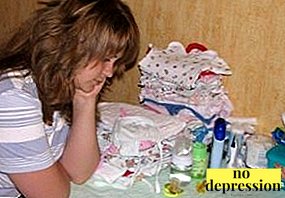 termination of employment before giving birth, dismissal from work, fear of losing your job or competing for a career;
termination of employment before giving birth, dismissal from work, fear of losing your job or competing for a career;- the passive attitude of the father of the child to the birth and upbringing of the baby, his indifference and lack of emotionality;
- past or present birth of a dead child or baby with a severe congenital disease;
- having other children or husband’s children from another woman;
- long separation from the baby immediately after birth in the past or present;
- fear of taking responsibility for the life and upbringing of the child;
- fear of doing something wrong, harm the child;
- too early or too late age of the mother (before 18 and after 40);
- sad, negative events that occurred immediately before childbirth;
- mother’s cool relationship with her own parents;
- fear of being ugly and fat, fear of not returning to its former form;
- unjustified expectations from the process of childbirth and the birth of a baby;
- physiological changes after childbirth, problems with breastfeeding (for example, lack of milk);
- the presence of psychological problems in the mother, predisposition to depression, possibly suicidal tendencies;
- violation of sexual or other relationships with a spouse, fear of always remaining unwanted.
The cause of postpartum depression may be the unreadiness of the woman to his new position.
Before girls were prepared for motherhood since childhood - they practically became second mothers for their younger brothers and sisters and often helped with childbirth.
Now this practice is practically absent, so many young mothers lack the advice and support of a more experienced and mature woman than herself.
Symptoms and signs

Signs of depression occurring on maternity leave are sometimes difficult to notice because the disease develops gradually and does not occur immediately after the birth of the baby.
In some cases, depression occurs after a couple of months after delivery, and in some - at any stage of pregnancy.
Depression manifests itself as follows:
- Depressed state, apathy, lethargy, slowness.
- Constant drowsiness and fatigue, even with the necessary rest.
- An incessant feeling of guilt in front of a child because of its failure to become a good mother and give the baby all that he deserves.
- Anxiety and concern for the life and health of the baby or for their own.
- Constant and gratuitous desire to cry, irritability without any reason.
- Itchy feeling of dissatisfaction with his life and his present state.
- Inability to concentrate on the object, defocusing attention, memory deterioration.
- Inability to make an independent decision, unexpected and atypical timidity.
- Sleep disturbance and loss of appetite.
- Decrease in sexual desire, aversion to intimate life.
- The emergence of feelings of rage from the cry of a child or the sound of her husband's voice.
- Feelings that all relatives and relatives are watching every movement and waiting for women to make a mistake in raising a baby.
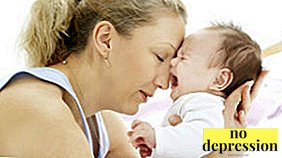 Feeling of helplessness before life and circumstances.
Feeling of helplessness before life and circumstances.- Lack of motivation, desire to do something or change.
- Aversion to own appearance.
In postpartum depression, a woman positions herself as a bad mother and wife, feels aversion to himself and even to the child. Often a woman sharpens her old phobias and fears, long-forgotten complexes.
How long does it take?
When does it take and how long does the postpartum depression last?
Every woman has a disease that starts differently: someone gets depressed still during pregnancy, and the birth of the baby only aggravates the condition of the mother, someone has the disease begins to manifest after several months after the appearance of the child, and someone appears immediately after birth.
Often, women first rejoice at the birth of the baby, and then begin to gradually "subside."
The duration of depression largely depends on the character and temperament of the woman herself, as well as on the people around her. It is very important to notice the condition of the young mother and to help her., get to ask for help, consult with a psychologist.
Postpartum depression without proper treatment may take several years. When working on the state of a woman, she will be able to throw off the suffocating leash of depression for a couple of months.
Implications for mother and child

Postpartum maternal depression severely affects the development of the baby - He at the subconscious level does not feel the connection with the mother, does not feel the security and her love.
All this at an early age adversely affects the psyche of the baby, giving rise to complexes and phobias, a certain behavior pattern.
Already in adolescence the child will begin to manifest suicidal tendencies, depressive states, inability to distinguish between love and hate, inability to start relationships with other people and so on.
The lack of emotional connection makes you feel unnecessary and abandoned, vulnerable, therefore, such a child often has problems in the development of speech and intellectual abilities. Growing up the child does not feel an emotional connection with the mother, he himself sooner retires from her.
For mother, postpartum depression is also has negative consequences - she also does not feel an emotional connection between herself and the child, so that she can later lead to a misunderstanding between the parent and the child, the dulling of maternal instinct and the lack of love for her child.
Also, a woman risks never to return to her former life, never to feel as young and beautiful as before.
Depression affects not only the self-esteem and the psychological health of the mother, but also her physiology - Often a woman begins to show various chronic diseases.
Features of the course in men
Depression, sense of uselessness and emptiness after childbirth is observed not only in women, but also in men who have recently become the fathers of newborn babies.
The appearance in the family of a new little man changes and the lifestyle of the newly minted parents changes dramatically, which can be a source of stress for both women and men.
Causes of Postpartum Depression men can have:
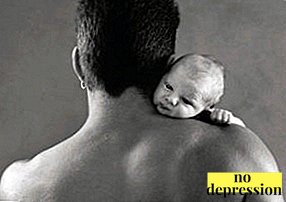 unwillingness to change, fear of responsibility;
unwillingness to change, fear of responsibility;- the differences between the expected and the real - often the paternal instinct wakes up not immediately, but after some time;
- depression and apathy of the wife;
- longing for the former way of life, for the former freedom;
- demanding on the part of women;
- chronic fatigue, lack of sleep due to the cries and troubles of feeding and laying down the child;
- the lack of attention and care of the spouse, who devotes all her time to her baby, the absence of the former sexual life;
- changes in the appearance of the beloved woman, who because of the worries and troubles associated with the baby, do not have time to look after themselves.
Often, a man simply does not have enough attention from her spouse, because a woman spends all her time on caring for a baby. The man is even a little jealous of his beloved woman for the child.
There is a male depression almost as much as a woman, but everything has some differences. Signs of postpartum depression in men:
- Apathy, detachment from the child and from the woman, fatigue and irritability.
- A rare appearance at home - the man seems to be specifically delayed at work in order to spend less time at home.
- Coldness with a baby, detachment from one’s own child.
- Impulsive behavior and careless actions - adultery, alcohol abuse, careless driving, and so on.
- Increased activity - a man cannot sit still and is constantly doing something, rushing somewhere. So the young father subconsciously tries to hide his anxiety and anxiety.
- Self-isolation, detachment from former pleasures and hobbies.
What to do: how to overcome the state? A woman can help her husband cope with this condition:
 talk heart to heart, find out the reasons for this behavior;
talk heart to heart, find out the reasons for this behavior;- there are small signs of attention to the husband (for example, to prepare his favorite dishes);
- to attach him to the cares of raising a baby, to try to awaken his father's instinct;
- put yourself in order for a husband - as they say, men love with their eyes;
- give him time for his own entertainment and not blame him for a little rest;
- try to devote some time to a man.
If the condition of the spouse does not become easier with time, then it is best to contact a specialist. A man is likely to resist, but he needs to be persuaded before it is too late.
Is there postpartum depression in men? The psychologist comments:
Edinburgh Scale
This scale consists of a questionnaire that allows you to determine the presence or absence of postpartum depression. You can complete the questionnaire yourself - they require the answers “yes”, “no”, “more often than always”, “rarely”.
Scale issues:
- I can laugh and notice the funny and funny aspects of the situation;
- I look forward to change;
- I blame myself for no reason, I feel guilty;
- I feel anxiety for no reason;
- I have an irrational fear or fear from time to time;
- I am under pressure of circumstances;
- I have trouble sleeping because of worries and anxieties;
- I feel miserable;
- I often cry and feel sad;
- I think about doing myself or others harm.
Edinburgh Postpartum Depression Scale - Test.
Postpartum depression: how to overcome? Find out from this video:
How to get rid?

How to cope with postpartum depression yourself at home?
Treatment depends largely on the psychological characteristics of the woman and the severity of the condition.
In any case, it is necessary to take antidepressants, which do not adversely affect breastfeeding and level the level of hormones in the body, and the observation of the attending psychiatrist.
Psychologists also advise women to attend group classes with young mothers who suffer from the same problem. Mothers also do not interfere with the communication in the forums with other women who have had depression.
Also very important support and assistance of loved ones - you need to take a certain share of the household duties of the mother, let her sleep and bring herself in order.
It is necessary to remind a woman that her own life does not end with the birth of a baby and the child will not prevent her from enjoying life much.
Among other treatments can highlight:
- hypnosis treatment;
- walks in the open air;
- stimulating interest in the life and upbringing of the child;
- family therapy.
How to help survive postpartum depression? The father of the child should also pay attention to the spouse, so that she felt her need and attractiveness.
It is necessary to surround a woman with her favorite things, try to cheer her up or allow her to relax and do what she loves most.
The main thing - don't leave a woman alone.
When is postpartum depression and how to treat it? About the timing and drug treatment in this video:
Preventive measures
Can you avoid postpartum depression? There is no 100% guarantee of avoidance, but there are a number of measures that help reduce the risk of disease:
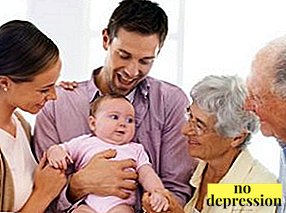 Seen before childbirth special courses for the care of the baby.
Seen before childbirth special courses for the care of the baby.- The participation of the father of the child in the prenatal and postpartum efforts associated with the baby.
- Discussion of all emerging issues and problems with the father of the child and relatives in advance, the distribution of responsibilities.
- Supporting relatives, especially female, getting advice from more experienced women and mothers.
- Correct pregnancy planning, readiness for any stressful situation.
- Reconciliation in the family, restoration of lost connections.
Parents still during pregnancy it is important to recognize the coming changes and teach not to be afraid of them. You need to be prepared that the usual life change forever.
Postpartum depression occurs in every fifth woman and every eighth man. If you have signs of depression, you should not withdraw into yourself and ask for help.
What to do to not fall into postpartum depression? How to get out of postpartum depression? Prevention:

 termination of employment before giving birth, dismissal from work, fear of losing your job or competing for a career;
termination of employment before giving birth, dismissal from work, fear of losing your job or competing for a career; Feeling of helplessness before life and circumstances.
Feeling of helplessness before life and circumstances. unwillingness to change, fear of responsibility;
unwillingness to change, fear of responsibility; talk heart to heart, find out the reasons for this behavior;
talk heart to heart, find out the reasons for this behavior; Seen before childbirth special courses for the care of the baby.
Seen before childbirth special courses for the care of the baby.